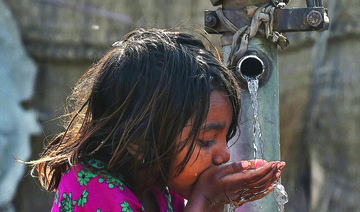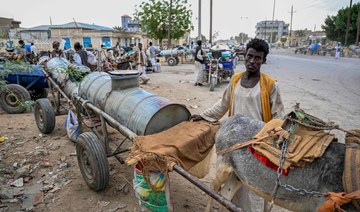SUSAH: A white foundation stone next to a deserted beach near the soporific Libyan port of Susah is all to show for a seven-year dream to build one of North Africa’s biggest ports.
Yet officials say Libya is now in final talks to award a US firm a $1.5 billion deal to set up a “mega port” intended to transform the picturesque coast where families go for picnics into a vast container hub.
Texas-based security firm Guidry Group confirmed to Reuters it planned to sign a 35-year deal to build and operate the project in a region once occupied by the ancient Greeks, before handing it back to the local authority.
Such major foreign investment would be rare for Libya, in chaos and conflict since the 2011 toppling of Muammar Qaddafi.
“The biggest container ships will be able to dock,” enthused one of the project’s main architects, Salah Elhasi, who heads the eastern port authority, in his modest villa-turned-office.
Abdalla Al Hasse, a consultant for Guidry, said sea depth of up to 40 meters (130 feet) would enable containers to load goods on smaller vessels headed for other Libyan cities as well as neighbors like Egypt or Tunisia without similar ports.
Ravaged by fighting between rival groups and split into different administrations, Libya urgently needs jobs for youths who otherwise look to a bloated public sector or take up guns to earn their daily bread.
Beyond oil, Libya has little successful economic activity, even importing milk. The port could provide 2,500 jobs.
Guidry wants to win local and foreign investment to help with financing and would like to start construction in October, Al Hasse said.
“Funding for the Port of Susah project is expected to come from a variety of sources, including international multilateral agencies, major financial institutions and international project finance investors as this project is a public private partnership,” Guidry said in an email.
The company has traditionally specialized in kidnap and ransom resolution, but now wants to expand into infrastructure.
“Libya is ripe for business and investment right now. I do not want the Chinese or the Russians in Libya first,” CEO Michael Guidry was quoted as saying in the Libya Herald last year. “I want to get a foothold in there now.”
HERITAGE FEARS
Beyond financing, there are other major challenges.
For starters, Libya still needs to fix its pot-holed roads and build a railway infrastructure.
The road from Susah to the next large city Bayda, for example, is unsuitable for trucks as it curves round steep cliffs with spectacular views of Roman rock tombs but no fence.
Some also fear a port may damage ancient historical sites.
Susah, with its sleepy fishing harbor next to historic temple columns and also some underwater sites, is close to the ancient Greek mountain city of Cyrene.
“We have a real fear of this project being built near Susah,” said Ahmed Hussein, head of the eastern antiquities department, who fears Ptolemaic era ruins could be damaged if the port leads to a new coastal road from Susah to Benghazi.
To counter some concerns, the planners say the port will be built 5 km (3 miles) outside Susah.
Their goal is for Libya to fully exploit its privileged Mediterranean location to become a major commercial hub between Africa and Europe. At the moment, its coastline is better known for illegal trafficking of migrants.
“Susah will be able to handle goods from eastern Asia, Europe and America to Africa,” Elhasi said.
Officials launched the port idea in 2012 when Libya looked set for peaceful elections. Since then, security has gone downhill though the east is more stable than the west.
Rival administrations run Libya’s west and east, though there is agreement on the need for a major new port given the outdated state of current ones. Susah would be deeper than Misrata, Libya’s biggest port at a free trade zone in the west.
The eastern-based Libyan National Army (LNA), commanded by Khalifa Haftar, would provide security at first in Susah.
For an hour, Elhasi passionately defended his vision against concerns the port could be yet another white elephant of the many dotted around Africa. “This investment will transform the Libyan mentality,” he said.
Locals interviewed by Reuters tended to agree.
“Many young people here don’t have a job,” said Sofyan Al-Obeidi, a fisherman and pharmacy student hoping the port project would give him a career.
























